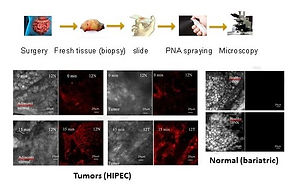RESEARCH

PNAs as splice switching oligonucleotides (SSO)
Our lab is developing novel peptide-PNA conjugates as SSO. In collaboration with the Karni lab at the Hebrew University, we are exploring the anti-cancer activity of such SSOs in cancer cells and in-vivo. Specifically we are looking at the MNK2 gene as the target gene. PNAs are shown to modulate MNK2 splicing thereby affecting cancer cell proliferation and invasiveness. In addition, we are now exploring targeted PNA delivery to brain tumor cancer cells with the vision to translate these studies to an in-vivo model of brain cancer in mice.

PNAs as antimiRs
Our laboratory is exploring a variety of targeted and unique peptides, such as cyclic peptides, that are conjugated to PNAs that target miRNA-155 that enhances the survival of cancer cells (a.k.a. oncomiR). The biological studies are done in collaboration with the Aqeilan Lab at the Hebrew University.

PNA diagnostics
We have developed a red-emitting cyanine dye (BisQ) that serves as a "surrogate base" that is introduced to the PNA sequence (a. k. a. FIT-PNA). Such FIT-PNA probe become fluorescent only after hybridization to their RNA target. We have shown that such FIT-PNAs can detect a point mutation in the KRAS oncogene (G12D) in living cells (see Figure above). In addition, we have developed such FIT-PNAs with the ability to detect RNA in fresh human tumor tissue taken directly from the operating room. This is achieved by simply spraying a solution of the FIT-PNA directly on the tissue followed by fluorescence imaging after a short incubation period of 15-45 minutes (see figure below). We believe that such probes may assist surgeons in cytoreductive surgery in the near future.
